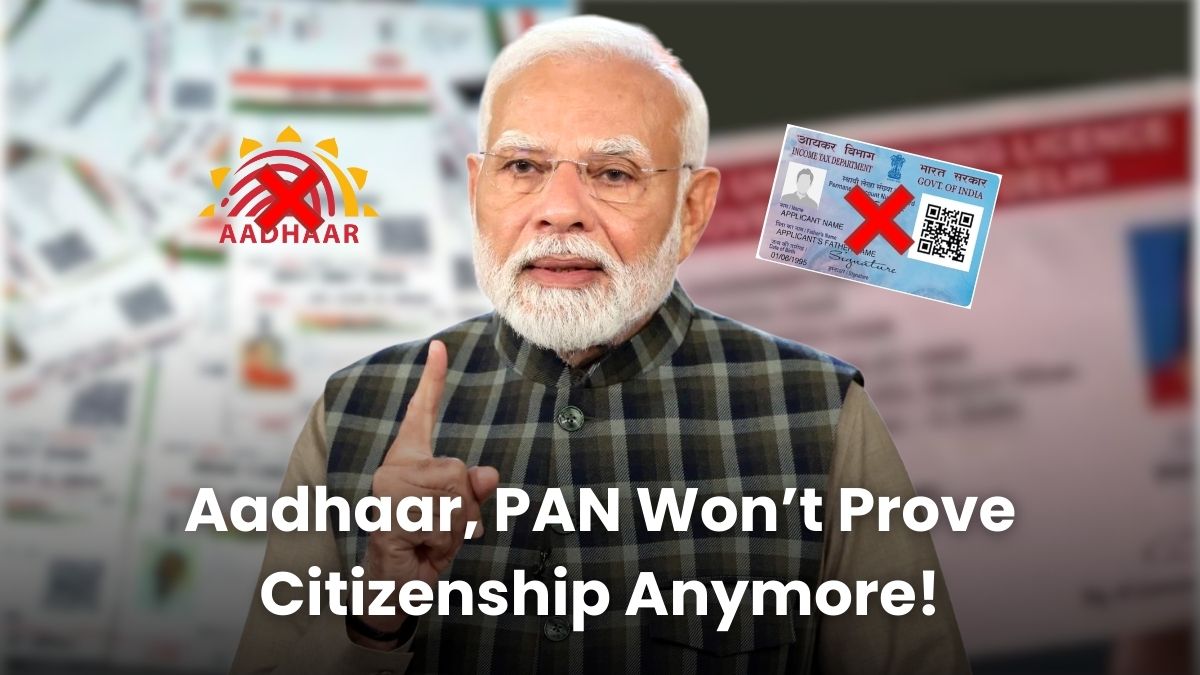Citizenship Proof Rule – A major change is here that could impact a lot of people across the country. If you’ve always thought your Aadhaar card or PAN card is enough to prove that you’re an Indian citizen, think again. The government has made it clear that these two documents will no longer be accepted as valid proof of citizenship. This new rule comes with strict instructions for police departments and verification authorities, and it’s important for everyone to understand what’s changing and how to stay on the right side of the law.
Why Aadhaar and PAN Are Not Considered Citizenship Proof Anymore
Let’s get this straight: Aadhaar and PAN cards are primarily identification and financial documents. They are useful in daily life for opening bank accounts, paying taxes, or getting a SIM card. But they don’t prove that you’re an Indian citizen.
Here’s why:
- Aadhaar is issued based on your residence, not citizenship. Even foreign nationals living in India for a certain time can get one.
- PAN is for tracking financial transactions and taxes. It’s not linked to your nationality and can also be issued to foreign entities working in India.
So while these documents are handy for many things, they were never meant to confirm someone’s citizenship status.
What Are the New Guidelines?
According to the latest instructions from the Home Ministry, police departments and government officials have been told to stop accepting Aadhaar and PAN as proof of citizenship. This directive is now being implemented nationwide, especially for background verifications, passport applications, and government jobs.
Officers are now required to verify citizenship only through documents that show:
- Birth in India to Indian parents
- Legal naturalization or registration as an Indian citizen
Only Two Documents Will Now Be Accepted
So, what can you use as valid proof of citizenship? The government has officially listed two documents:
- Indian Passport – This is issued only after a full verification of your nationality.
- Birth Certificate – Issued by a municipal authority, this document confirms you were born in India to Indian parents.
These are now the only documents that will be accepted as standalone proof of Indian citizenship.
What About Other Documents?
You might be wondering about voter ID, ration cards, or driving licences. Here’s a quick breakdown:
| Document | Accepted for Citizenship? | Main Purpose |
|---|---|---|
| Aadhaar Card | No | Identity verification |
| PAN Card | No | Tax and financial tracking |
| Indian Passport | Yes | Travel and citizenship proof |
| Birth Certificate | Yes | Confirms place and date of birth |
| Voter ID | No | Voting eligibility |
| Ration Card | No | Household and food entitlement |
| Driving Licence | No | Authorizes you to drive |
| School Leaving Certificate | No | Academic history |
While some of these may support your claim, they aren’t considered conclusive proof of citizenship on their own.
Who’s Going to Be Affected the Most?
This change is likely to impact many individuals, especially:
- Job seekers applying for government roles
- Students applying for visas or international programs
- NRIs and OCI card applicants needing to prove Indian heritage
- People going through police verification for passports, rentals, or other clearances
If you don’t have a passport or birth certificate, you may face delays or even rejection in these cases.
What Should You Do Now?
To avoid any trouble in the future, it’s best to act now:
- Check if you already have an Indian passport or an official birth certificate
- If not, apply for a passport through the official process
- If your birth certificate is lost or has errors, contact your local municipal office for a duplicate or correction
- Do not use Aadhaar or PAN as proof of citizenship in any official documentation going forward
What Happens If You Don’t Comply?
Using Aadhaar or PAN as citizenship proof could lead to:
- Application rejections for passports or government benefits
- Police not clearing your verification
- Delays in important processes like job selection or document approvals
- Legal issues in serious cases of misrepresentation
Government departments have been told to reject any claims of citizenship that aren’t backed by acceptable documents.
What’s the Government Saying?
The Ministry of Home Affairs has clearly stated that only legally verified documents will be accepted going forward. State-level police officers have also been instructed to follow the rule strictly and ensure that only genuine citizens get clearance in official processes.
This move is part of a larger effort to bring more clarity and standardization to citizenship verification in India, especially with rising concerns around illegal immigration and document misuse.
If you’re planning to apply for a passport, government job, or any official scheme, make sure you have either your passport or birth certificate ready. Don’t rely on Aadhaar or PAN alone. It’s always better to prepare in advance than face problems later.
Having the right documents not only helps you avoid trouble but also ensures that your identity as a citizen is recognized in the eyes of the law.






